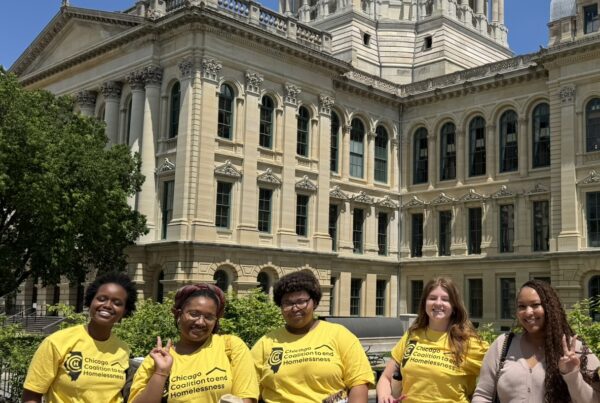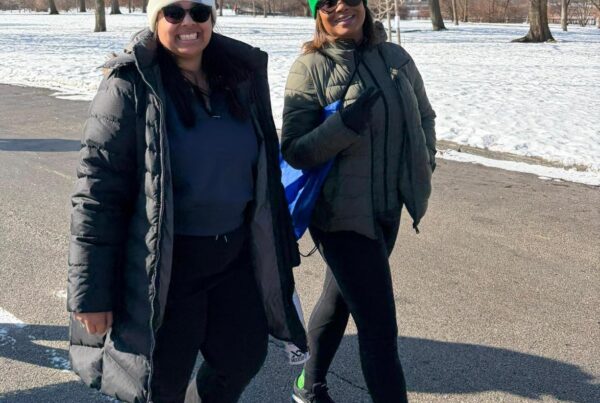Chicago Coalition for the Homeless sent these recommendations to city, Cook County, and state officials on March 15.
We recognize the scope of this pandemic and the response needed is unprecedented. The homeless advocacy and service community stands ready to work with the city, county, and state government to ensure Illinois’ homeless population receives the care and attention necessary to ensure both their and the broader community’s safety.
These recommendations are based on input from homeless service providers — both shelters and street outreach — as well as community leaders that have experienced homelessness. They also reflect action being taken in other parts of the country to address the particular needs of people experiencing homelessness.
We urge the city of Chicago to immediately identify government resources (city, county, state, federal) to create isolation/prevention housing with supportive services in hotels or federal/military facilities for the following groups:
- Individuals who are staying on the street during the social distancing period, prioritizing those of vulnerable populations (age 60+ or with underlying health conditions),
- Individuals staying in shelter, especially large congregate dormitory type settings, or doubling-up and exhibiting symptoms,
- Individuals of vulnerable populations (age 60+ or with underlying health conditions) staying in shelters, even if they are asymptomatic.
- Individuals who contracted COVID-19 and are discharged from the hospital, but still need to rehabilitate and/or isolate
In addition, spaces should be held in longer-term shelter programs for those who wish to return to their programs after hospitalization or isolation.
Additional recommendations are provided below.
- Access to supplies
- City-coordinated bulk buying of cleaning supplies from manufacturers to distribute to homeless service providers and people experiencing homelessness
- Provide shelter, outreach, and health care staff with personal protective equipment
- Educational materials
- Create physical and e-materials that explain the branches of our local governments, their responsibilities, and the best ways to access, communicate with each entity. This may include ways to get city alerts and updated county materials
- Create age and developmentally appropriate health materials for diverse populations.
- Develop and make widely available a concise list of locations for testing and medical care, and update as needed
- Staffing concerns
- Create flexibility in grants so that staff funded through one grant can cover absent staff funded through another grant
- Move staff between agencies when one facility is low on participants (e.g. child care centers where parents are keeping children at home)
- Waive DCFS licensing requirements to enable moving staff between programs
- Create and share a contingency plan in case there are not enough staff able to come in to work to operate a shelter
- Guidance on outstanding questions
-
- If a participant has symptoms but refuses medical care
- If a shelter resident is identified having COVID-19 and may have infected other staff and residents
- If drop-in centers should continue all current activities or reduce contacts
- Impact on future funding
- Waive city and state grant performance measures for the duration of the pandemic
- Automatically grant extensions for people who are reaching the end of their stay in time-limited programs
- Screening measures
- Create outdoor screening locations before infected people mingle with others in the shelter. Utilize medical student volunteers to staff these locations
- Help advocate for expanded ability for testing amongst people experiencing homelessness. Current CDPH guidelines are too strict
- Encampment recommendations
- Provide educational materials about COVID-19, preventative measures and where to go if you contract the virus
- Widespread distribution of hand sanitizer, food and water
- Handwashing stations at all locations where people are living outside (not limited to large encampments)
- Portable toilets at all locations where people are living outside
- Suspension of usual street cleaning procedures; limit cleaning to removing garbage; do not require people to move themselves or their belongings; protection of people’s belongings
- Develop a plan for keeping mobile outreach vehicles clean and sterile while continuing to be able to deliver services
- Distribute supplies to help those in encampments implement social distancing and self isolation
- Help advocate for/identify resources
- Identify and allocate emergency, flexible general operating funding that can be used towards any crisis needs, including, but not limited to:
- paying for additional staffing,
- covering expanded paid sick leave,
- hiring specialized cleaning services,
- buying cleaning and medical supplies
- providing food and water
- providing curtains/dividers at congregate shelters
- storage containers
- gender specific hygiene materials
- additional shelter spaces to increase social distancing especially to reduce the population in large, congregate settings
- State and County should allocate resources for suburban communities that rely on volunteer churches for shelter. Provide alternative shelter options such as hotels
- Identify any available ESG funding to put toward this effort which has been deemed eligible by HUD already
- Identify support for free, charitable health clinics that are not Federally Qualified Health Centers and will not qualify for federal resources
- Increase funding for the state Homelessness Prevention Program
- Identify and allocate emergency, flexible general operating funding that can be used towards any crisis needs, including, but not limited to:
- Support students experiencing homelessness during school closures
-
- Provide students and families experiencing homelessness with transportation assistance to get to alternative locations where food is being distributed, or to a school location that is open for students who do not have a safe place to be.
- Provide students who are homeless additional technology and data support if e-learning is being delivered during the period schools are closed. Completing schoolwork online is obviously difficult for students without access to technology or data plans. Doing schoolwork generally is very challenging in shelters or overcrowded doubled-up situations, where there may not be a suitable place to study.
- Communicate with students and families to make them aware of food resources, transportation assistance and other support; include these messages in all communication strategies related to school closures, including emails, media, social media and website information
- Colleges should make clear that students experiencing homelessness or who have no safe place to go may remain in on-campus housing. In addition they should help to identify grants to help them buy food
- Preventive measures in other systems
- Release those from Cook County Jail who are only there because they cannot afford cash bail
- Place a moratorium on initiating evictions
- Call on the CHA the Chicago Low-Income Housing Trust Fund to temporarily halt hearings and paperwork requirements that could lead to tenants losing their housing.
- Request mortgage companies on the verge of foreclosing on homes of residents to suspend actions that could lead to families already dealing with deficits to lose their homes
- Promote and support general health screenings beyond COVID-19, to support general immune system health like flu, asthma, early detection of other immune system challenges
- Work to guarantee that individuals also receive coordinated care for other pre-existing conditions or needs (e.g., medically assisted drug treatment, HARRT medications, HCV meds, etc.) they had prior to the COVID-19 crisis.
- Create safe and continuing access to public benefits
-
- Suspend redeterminations and terminations for programs such as SNAP, TANF, and Medicaid;
- Expedite approval and suspend terminations for ABD (aged/blind/disabled) Medicaid cases;
- Request statewide SNAP ABAWD waiver;
- In order to reduce the need to visit local FCRCs in person, increase access to applications and other case management services over the phone or online, including access to ABE accounts where ID proofing is impossible due to age or lack of credit history of users;
- Hold DHS appeals and benefits interviews telephonically wherever possible.
- Expedite unemployment claims determinations






